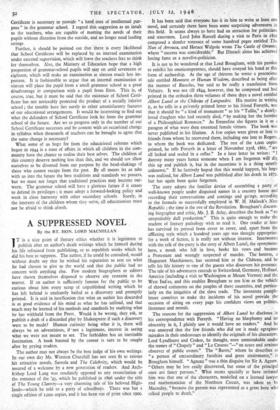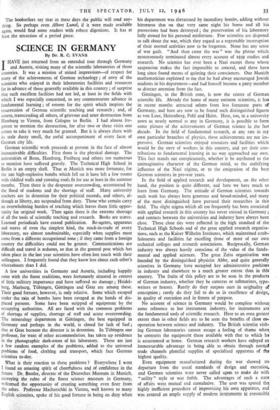A SUPPRESSED NOVEL
By the RT. HON. LORD MACMILLAN
jT is a nice point of literary ethics whether it is legitimate to . publishafter an author's death writings which he himself during his life refrained from publishing, or to republish works which he did his best to suppress. The author, if he could be consulted, would without doubt say that he wished his reputation to rest on what he had chosen to give to the world and that the public had no concern with anything else. Few modern biowapheri or editors have shown theniselves disposed to observe any restraint in the matter. If an author is sufficiently famous for the public to be curious about him every scrap of unpublished writing which he has left behind is exultantly hailed as a discovery and promptly printed. It is said in justification that what an author has discarded is as good evidence of his mind as what he has utilised, and that much may be learned of his methods and standards by studying what he has withheld from the Press. Would it be wrong, they ask, to publish a draft of a discarded play by Shakespeare if such a discovery were to be made? Human curiosity being what it is, there will always be an adventitious, if *not a legitimate, interest in seeing what we were not meant to see. The forbidden has an inevitable fascination. A book banned by the censor is sure to be sought after by prying readers.
The author may not always be the best judge of his own writings. In our own day Mr. Winston Churchill has not seen fit to reissue his attractive novels, Savrola and The Celebrity, which would be assured of a welcome by a new generation of readers. And Arch- bishop Lord Lang was resolutely opposed to any resuscitation of the romance of the '45, which he published in 1896 under the title Of The Young Clanroy—a very charming tale of his beloved High- lands—which he told to a party of schoolboys. There was but a single edition of i,000 copies, and it has been out of print since 1900. It has been said that everyone has it in him to write at least one novel, and certainly there have been some surprising adventures in this field. It seems always to have had an attraction for politicians and statesmen. Lord John Russell during a visit to Paris in 182o composed a slender romance of some hundred pages entitled The Nun of Arrouca, and Horace Walpole wrote The Castle of Otranto, whose " success was considerable." But Disraeli alone has achieved lasting fame as a novelist-politician.
It is not to be wondered at that Lord Brougham, with his passion to exhibit-his omnicompetence, should have essayed his hand at this
form of authorship. At the age of thirteen he wrote a precocious tale entitled Memnon or Human Wisdom, described as being after the manner of Rasselas, but said to be really a translation from Voltaire. It was not till 1844, however, that he composed and had printed in the orthodox three volumes of those days a novel entitled Albert Lunel or the Chateau of Languedoc. His motive in writing it, as he tells in a privately printed letter to his friend Forsyth, was that it should be " a kind of monument " to his " Turns," a dearly- loved daughter who had recently died, -" by making her the heroine of a Philosophical Romance." As Emmeline she figures in it as a paragon of what were then esteemed female virtues. The book was
never published in his lifetime. A few copies were given or lent to
friends from whom he recovered them, including one lent to Rogers, to whom the book was dedicated. The rest of the t,000 copies printed, he tells Forsyth in a letter of November 23rd, 1861, "are all locked and sealed In a cellar." In a later letter he writes: " I daresay many years hence someone when I am forgotten will dig this up and publish it, but in the meantime it is a thing utterly unknown." If he furtively hoped that this would happen, his hope was realised, for Albert Lunel was published after his death in 1872, but has again been quite forgotten.
The story adopts the familiar device of assembling a party of well-known people under disguised names in a country house and recording their conversations and comings and goings, according to the formula so successfully employed in W. H. Mallock's New Republic ; the time is the eve of the Revolution. Brougham's discern- ing biographer and critic, Mr. J. B. Allay, describes the.book as " an unspeakably dull production." This is quite enough to make the student of literary pathology wish to read it. One reader at least has survived its perusal from cover to cover, and, apart from the afflicting style which a hundred years ago was thought appropriate for a work of fiction, it is really not without interest. Interwoven
with the talk of the-party is the story of Albert Lund, the eponymous hero, a monk who fell in love, broke his vows and became a Protestant and wrongly suspected of murder. The- hostess, a
Huguenot Marchioness, has secreted him at the Château, and he tells his life history to one of the guests who discovers his presence.
The tale of his adventures extends to Switzerland, Germany, Holland, America (including a visit to-Washington at Mount Vernon) and the West Indies, and this enables Brougham to use him as the vehicle of shrewd continents on the peoples of these countries, and particu- larly on the iniquities of the slave trade. The inveterate pamph- leteer contrives to make the incidents of his novel provide the occasion of airing on every page his confident views on politics, literature and morals.
The reasons for the suppression of Albert Lunel he discloses in
his correspondence with Forsyth. "Having no blasphemy and no obscenity in h, I plainly saw it would have no readers." And he was annoyed that the few friends who did see it made egregious mistakes in their endeavours to identify the originals of his characters. Lord •Lyndhurst and Croker, he thought, were unmistakable under
the names of " Chapely " and " La Croasse "—" an acute and anxious observer of public events." The " Baron," whom he describes as "a person of extraordinary faculties and great attainments," is Brougham himself. " Agneau" was a thin disguise for Sir A. Agnew. "Others may be less _easily discovered, but some of the principal ones are fancy persons." Whit seems specially to have irritated him was that one of the characters, modelled on a learned lawyer and mathematician of the Northern Circuit, was taken to be Macaulay, " because the person was represented as a great bore who talked people to death." The booksellers say that in these days the public will read any- thing. So perhaps even Albert Lunel, if it were made available again, would find some readers with robust digestions. It has at least the attraction of a period piece.































 Previous page
Previous page